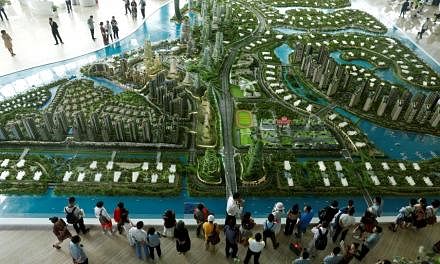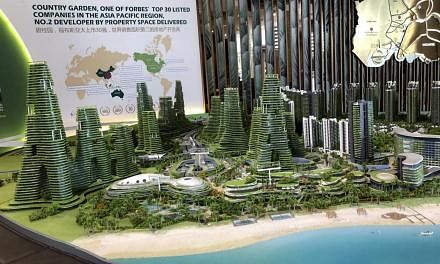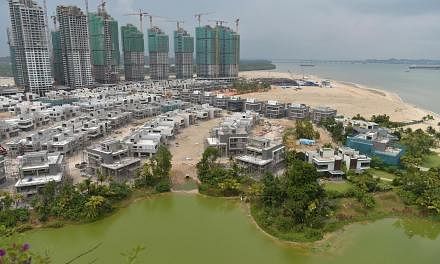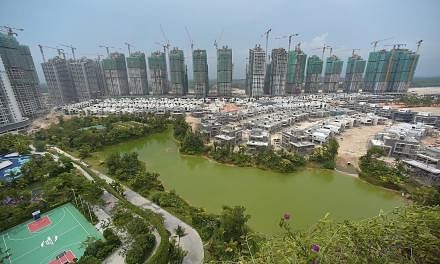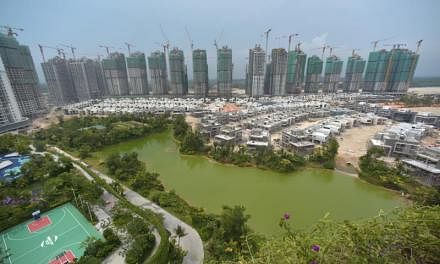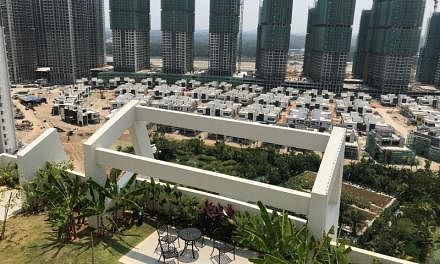SYDNEY (BLOOMBERG) - Hanging a "foreigners not welcome" sign on a giant real estate development, Malaysia's prime minister this week appeared to add to housing curbs around the world fuelled by soaring home prices and populist politics.
Describing the Chinese-backed US$100 billion Forest City as "built for foreigners" and beyond the reach of ordinary Malaysians, Mahathir Mohamad tapped the nationalist rhetoric that helped secure him an election victory -- and global angst over housing affordability. Around the world, post-financial crisis property booms driven by low interest rates have left locals struggling to buy homes.
"The tension around foreign investment is always going to be much more acute when affordability is getting worse," said Brendan Coates, a researcher in Melbourne at the Grattan Institute think tank. When locals get "priced out of the market", foreign buyers may be blamed even when their effect is small, he said, commenting on the global picture.
A wave of restrictions or taxes on foreign purchases already stretches from Sydney to Hong Kong to Vancouver. Measures targeting foreign homebuyers have included stamp duties, restrictions on property pre-sales to non-residents and limits on the types of homes that can be purchased.
New Zealand is banning foreigners from buying existing residential properties after Prime Minister Jacinda Ardern campaigned in last year's election on pledges including affordable housing. Canada and Australia have rolled out one restriction after another, and Singapore just ramped up a tax on overseas buyers. Denmark and Switzerland have restrictions, a Grattan report shows.
The 93-year-old Dr Mahathir's comments came at a late stage of the game. Globally, property shows signs of cooling from the post-crisis boom. His concern seems to be sparked not by property market overheating but, rather, foreign investments that don't benefit Malaysia and what he terms the risk of "a new version of colonialism".
Late on Tuesday (Aug 28), a statement from Dr Mahathir's office said the nation welcomes all tourists, including from China, as well as foreign direct investment that "contributes to the transfer of technology, provides employment for locals and the setting up of industries". It didn't refer to Forest City.
"Mahathir has never liked the idea of Forest City or the idea of many foreigners buying up property in Malaysia," said Ryan Khoo, co-founder of Alpha Marketing Pte Ltd, a Singapore-based real estate consultancy.
Foreigners will be blocked from buying units at the project, on artificial islands in Johor, and refused visas to live there, Dr Mahathir said at a press briefing on Monday. That left analysts and local officials parsing his words to guess at how bans might work. The Chinese developer, Country Garden Holdings Co, said his comments clashed with past assurances. The project's targeted buyers have included people in mainland China.
With a wall of Chinese money blamed for pushing up prices around the world, local lawmakers, media and the public can struggle to disentangle xenophobia from legitimate efforts to constrain inflows of capital. In Australia, "populist reporting" exaggerated the role of Chinese investors, according to Hans Hendrischke, a professor of Chinese business and management at the University of Sydney.
Chinese buyers had the "bad luck" of becoming overly visible in markets around the globe, said Carrie Law, chief executive officer of Juwai.com, a Chinese international property website.
Foreign buyers get blamed for soaring home costs even when the evidence is minimal. More than 60 per cent of Sydney residents cite foreign investment for price increases, according to a survey from University of Sydney academic Dallas Rogers. That's despite research by Australia's Treasury showing only a marginal impact. Likewise, data suggests foreign buyers play only a small role in New Zealand's housing market.

